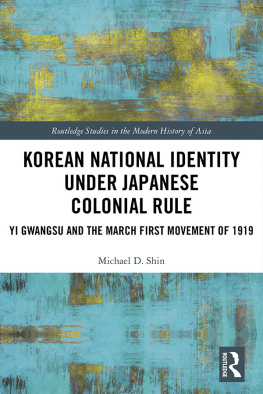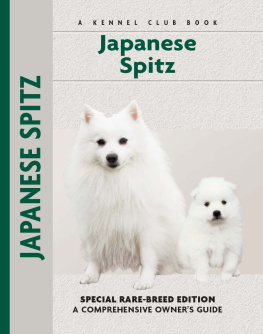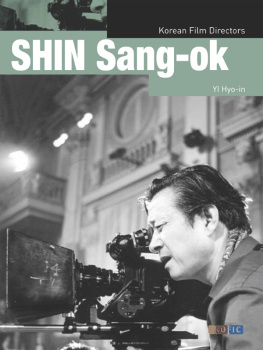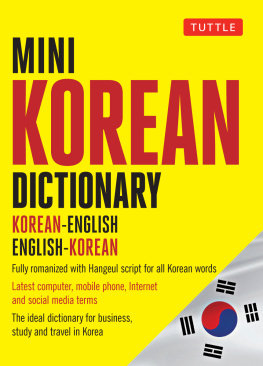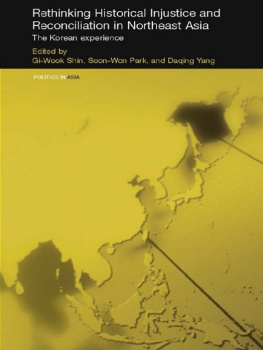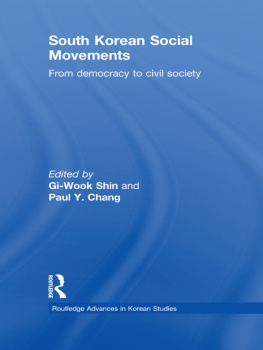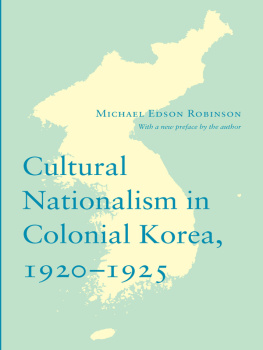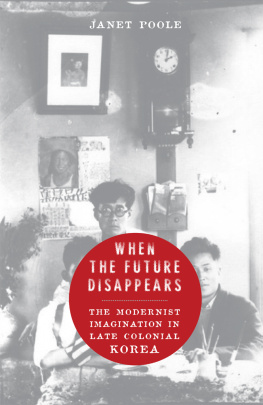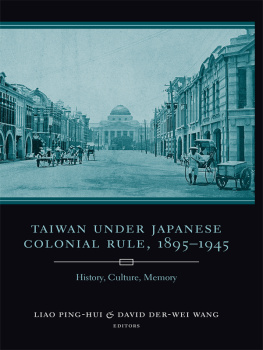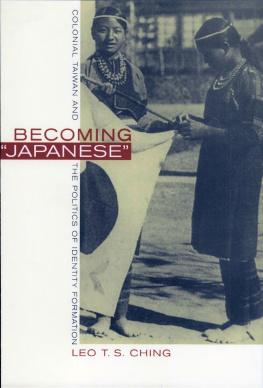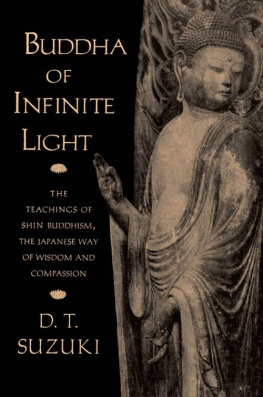Shin Michael - Korean National Identity under Japanese Colonial Rule
Here you can read online Shin Michael - Korean National Identity under Japanese Colonial Rule full text of the book (entire story) in english for free. Download pdf and epub, get meaning, cover and reviews about this ebook. year: 2018, genre: Politics. Description of the work, (preface) as well as reviews are available. Best literature library LitArk.com created for fans of good reading and offers a wide selection of genres:
Romance novel
Science fiction
Adventure
Detective
Science
History
Home and family
Prose
Art
Politics
Computer
Non-fiction
Religion
Business
Children
Humor
Choose a favorite category and find really read worthwhile books. Enjoy immersion in the world of imagination, feel the emotions of the characters or learn something new for yourself, make an fascinating discovery.
- Book:Korean National Identity under Japanese Colonial Rule
- Author:
- Genre:
- Year:2018
- Rating:3 / 5
- Favourites:Add to favourites
- Your mark:
- 60
- 1
- 2
- 3
- 4
- 5
Korean National Identity under Japanese Colonial Rule: summary, description and annotation
We offer to read an annotation, description, summary or preface (depends on what the author of the book "Korean National Identity under Japanese Colonial Rule" wrote himself). If you haven't found the necessary information about the book — write in the comments, we will try to find it.
Shin Michael: author's other books
Who wrote Korean National Identity under Japanese Colonial Rule? Find out the surname, the name of the author of the book and a list of all author's works by series.
Korean National Identity under Japanese Colonial Rule — read online for free the complete book (whole text) full work
Below is the text of the book, divided by pages. System saving the place of the last page read, allows you to conveniently read the book "Korean National Identity under Japanese Colonial Rule" online for free, without having to search again every time where you left off. Put a bookmark, and you can go to the page where you finished reading at any time.
Font size:
Interval:
Bookmark:

Modern Korean nationalism has been shaped by the turbulent historical forces that shook and transformed the peninsula during the twentieth century, including foreign occupation, civil war, and division. This book examines the emergence of the nation as the hegemonic form of collective identity after the March First Movement of 1919, widely seen as one of the major turning points of modern Korean history. The analysis focuses on Yi Gwangsu (18921950), a pioneering novelist, newspaper editor, and leader of the nationalist movement, who was directly involved in many aspects of its emergence during the Japanese occupation period. Yi Gwangsu was one of the few intellectuals who not only wrote for almost the entirety of the colonial period but who also was centrally involved in many institutions related to the production of identity. By focusing on Yi Gwangsu the book provides a different kind of historical narrative linking the various fragments of the nation, puts forward a new understanding of the March First Movement and its role in the emergence of the nation, and demonstrates how central to the emergence of the nation were the development of the print industry, the rise of a modern readership, and the emergence of a capitalist market for print. This book shows how the March First Movement catalyzed the confluence of these factors, enabling the nation to emerge as the dominant form of collective identity.
Michael D. Shin is a Lecturer in Korean Studies and a Fellow of Robinson College at the University of Cambridge, UK.
Routledge Studies in the Modern History of Asia
The Dismantling of Japans Empire in East Asia
Deimperialization, Postwar Legitimation and Imperial Afterlife
Edited by Barak Kushner and Sherzod Muminov
Public Health and the Modernization of China, 19102015
Liping Bu
The Economy of Colonial Malaya
Administrators versus Capitalists
Sivachandralingam Sundara Raja
Secularism, Decolonisation, and the Cold War in South and Southeast Asia
Clemens Six
Chinese Middlemen in Hong Kongs Colonial Economy, 18301890
Kaori Abe
World War Two Legacies in East Asia
China Remembers the War
Chan Yang
Civil Society and Postwar Pacific Basin Reconciliation
Wounds, Scars, and Healing
Edited by Yasuko Claremont
Korean National Identity under Japanese Colonial Rule
Yi Gwangsu and the March First Movement of 1919
Michael D. Shin
For a full list of available titles please visit: www.routledge.com/Routledge-Studies-in-the-Modern-History-of-Asia/book-series/MODHISTASIA
Yi Gwangsu and the March First Movement of 1919
Michael D. Shin

First published 2018
by Routledge
2 Park Square, Milton Park, Abingdon, Oxon OX14 4RN
and by Routledge
711 Third Avenue, New York, NY 10017
Routledge is an imprint of the Taylor & Francis Group, an informa business
2018 Michael D. Shin
The right of Michael D. Shin to be identified as author of this work has been asserted by him in accordance with sections 77 and 78 of the Copyright, Designs and Patents Act 1988.
All rights reserved. No part of this book may be reprinted or reproduced or utilised in any form or by any electronic, mechanical, or other means, now known or hereafter invented, including photocopying and recording, or in any information storage or retrieval system, without permission in writing from the publishers.
Trademark notice: Product or corporate names may be trademarks or registered trademarks, and are used only for identification and explanation without intent to infringe.
British Library Cataloguing-in-Publication Data
A catalogue record for this book is available from the British Library
Library of Congress Cataloging-in-Publication Data
A catalog record for this book has been requested
ISBN: 978-1-138-68308-2 (hbk)
ISBN: 978-1-315-54471-7 (ebk)
Typeset in Times New Roman
by Wearset Ltd, Boldon, Tyne and Wear
When completing a book, one cannot avoid being reminded of how much help and support one has received along the way. Certain footnotes, primary sources, or passages contain not just text but also memories of people and institutions that provided intellectual stimulation and facilitated my research. As is often true in these cases, there are so many to thank that I am worried that I will forget someone important.
My greatest intellectual debt is to my advisors and teachers at the University of Chicago: Bruce Cumings, Harry Harootunian, and Tetsuo Najita. Their intensive seminars provided a strong foundation for my research, and the longer I am in the field, the more amazed I am at how much time they spent with graduate students, doing close readings of texts. Their commitment to critiquing the orthodoxies of the field and their willingness to question their assumptions and explore new paradigms serve as models of scholarship that I hope to live up to someday. I also want to thank Bruce for his friendship and continuing intellectual companionship since I graduated. It was my good fortune that my time at Chicago overlapped with other graduate students whose work has taught me much: Charles Armstrong, Henry Em, Kim Dongno, and Namhee Lee. Albert Park has been a reliable friend and fellow traveler who has been a valued sounding board for my work. I also owe much thanks to my advisors and teachers at Berkeley where I did my masters degree: Thomas Gold, John Treat, and Ann Lee, who introduced me to the work of Yi Gwangsu and other early twentieth century writers.
In South Korea, I have had a long and productive relationship with the Department of History at Yonsei University. As a graduate student, I spent two years at Yonsei University in South Korea at the Institute for Korean Studies (Gukhak yeonguwon) while doing dissertation research. I audited classes taught by the late Pang Kie-chung and Hong Sung-Chan that gave me rigorous training in primary sources that complemented what I learned at Chicago. I also participated in informal seminars and study groups with the graduate students working on modern Korean history, including Chung Jina, Chung Yongseo, Gim Seongbo, Jang Gyusik, Jang Shin, Lee Seung-ryul, Oh Jinseok, Park Jongrin, Park Yunjae, and Wang Hyun-Jong. I have learned much from our discussions over the years; in many cases, they have not only given me valuable advice or commentary but also helped me to find primary sources or shared materials with me. There are many other colleagues at Yonsei or connected with it to whom I owe thanks. Special thanks goes to Lee Injae and his family for taking care of me while I was in Seoul. Lee Jiwon has also taught me much about modern Korean history over the years. Choi Yoon-Oh and Baek Seung-Chul have been patient in teaching me much about the Joseon period, including many basic aspects. Of course, colleagues at other institutions have provided valuable advice and been intellectual companions over the years, including Kim Dong-Taek, Kwon Bodurae, Park Tae-gyun, and Ryu Junpil.
I spent almost a year in Japan doing research while I was a student at the Inter-University Center for Japanese Language Studies in Yokohama. A friend from my Chicago days, Naoyuki Umemori, a professor in the Department of Political Science at Waseda University, enabled me to get a library card to do research there. Colleagues at the Tokyo University of Foreign Studies, Yonetani Masafumi and Nakano Toshio, gave me a warm welcome and opportunities to learn from the stimulating group of scholars and students there. The staff at the Research Institute for Oriental Cultures at Gakushuin University were also very helpful when I visited their archives.
Font size:
Interval:
Bookmark:
Similar books «Korean National Identity under Japanese Colonial Rule»
Look at similar books to Korean National Identity under Japanese Colonial Rule. We have selected literature similar in name and meaning in the hope of providing readers with more options to find new, interesting, not yet read works.
Discussion, reviews of the book Korean National Identity under Japanese Colonial Rule and just readers' own opinions. Leave your comments, write what you think about the work, its meaning or the main characters. Specify what exactly you liked and what you didn't like, and why you think so.

